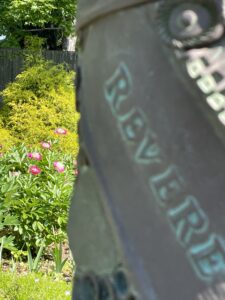“Who controls the past controls the future. Who controls the present controls the past.”
At a meeting of the Worship Committee this week it was pointed out to me that next fall we’ll mark the 380th “birthday” of North Parish. That’s quite a milestone! It feels especially wonderful to look towards that anniversary from the viewpoint of a healthy congregation! Congregations- which are not federally funded and are somewhat more protected than non-profits by the Religious Freedom Restoration Act (RFRA) of the 1990s- are such critical institutions and gathering places in our communities these days.
 We also just passed another anniversary: the 200th anniversary of the founding of the American Unitarian Association (or AUA) on May 25,1825. (This was 180 years after the congregation’s founding.) Ten years later in 1835, the Unitarians and Trinitarians in North Andover would part ways, and in 1836 our Meeting House was built as a Unitarian Meeting House. The Essex Country Unitarian Association met at the home of North Parish minister the Rev. Bailiey Loring, who served for 40 years from 1810 to 1850. This Sunday, we’ll exchange flowers and remember that we are just the latest in a long line of witnesses- and are part of an evolutionary history. (You can read more about the AUA’s 200th anniversary here.)
We also just passed another anniversary: the 200th anniversary of the founding of the American Unitarian Association (or AUA) on May 25,1825. (This was 180 years after the congregation’s founding.) Ten years later in 1835, the Unitarians and Trinitarians in North Andover would part ways, and in 1836 our Meeting House was built as a Unitarian Meeting House. The Essex Country Unitarian Association met at the home of North Parish minister the Rev. Bailiey Loring, who served for 40 years from 1810 to 1850. This Sunday, we’ll exchange flowers and remember that we are just the latest in a long line of witnesses- and are part of an evolutionary history. (You can read more about the AUA’s 200th anniversary here.)
When you’re curious, there is no end to what one can learn about history and its lessons for the present and future. At a film showing at North Parish on Tuesday night I learned that Francis Scott Key, author of the words to our national anthem The Star Spangled Banner, was a slaveowner and a lawyer who, as District Attorney of Washinton D.C., argued for the death penalty for two men: a 19 year old Black man accused of threatening a white woman even though the woman didn’t want him prosecuted, and a white doctor and botanist who was arrested for possessing abolitionist literature- which Key called “seditious libel”. The white doctor was under particular suspicion because his sister had organized a school for Black children. He was interrogated in jail while an angry mob milled about outside. Legal persecution, labeling freedom literature seditious, tolerating angry mobs… it’s important to know our history. And, perhaps, to wonder now and then about how we’ll be remembered.
See you Sunday, with whatever flowers I can find!
Rev. Lee
